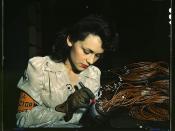Gluck uses strong diction to create vivid images in order to convey the hatred and helplessness that is the core of the character.
Although the diction is relatively colloquial, there are some prominent words, which are utilized to exhibit the woman's emotions. The first two lines of the poem are bursting with powerful lexis, "It is not the moon, I tell you. / It is these flowers..." (1-2). The woman hates men, and uses influential words to aid in her belief. The word moon suggests power. The subject uses moon to indicate that men have power over women. This is the initiation of her argument, that men control woman, and that is the cause of her hatred. The word flower implies innocence, specifically, the desire for love and purity. The flower is the target for all women, including her, however, the probability of obtaining said goal, is dubious. The persona furthers her contention against men when she declares that, "She hates sex" (5).
Sex contains a binary meaning. Sex can either mean that she hates men, which has already been established, or sex may mean intercourse. It is proven later in the poem, that the hatred of sex includes both aspects. In discussing the "paralyzing body," it is in reference to a man's body against her body. The thought of a male paralyzing her body, disgusts her. The poem concludes by mutating the tone of from defensive and firm to dreamy with a tinge of hope. When the woman says, "How can I be content / when there is still / that odor in the world?" (22-24), she is revealing the first sense of hope. Odor insinuates the desire for the flower. The odor is yearning for love, respect, and equality.
Abhorrence and vulnerability are omnipresent. Although the diction represents...


